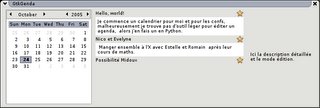
Hier soir j'ai terminé les features manquants dans bedwyr, je dis pas que c'est pas bugué, mais aujourd'hui j'ai pu faire autre chose. Le problème c'est qu'au lieu de bosser, j'ai bouquiné du Ruby, et codé une ébauche d'agenda en Ruby. Je me suis tourné vers ce langage car il dispose d'une meilleure lib iCal que les autres. Il a une grosse communauté, je pense donc pouvoir facilement intégrer si je vais jusque là des possibilités d'édition de calendriers distants via WebDAV. En plus, c'est plutôt plus sympa que Python finalement. L'idée pour l'interface c'est d'avoir au début une seule colonne avec un calendrier, puis de choisir un jour, ce qui provoque l'affichage d'une partie des composants d'agenda, et si on en sélectionne un on a une vue encore plus précise du composant. Là c'est super schématique, mais dans l'idée la colonne agenda peut servir pour filtrer par source, type, mois, contenu, que sais-je. Enfin si vous avez pas compris, j'essaie de faire une interface façon Finder Mac OSX, pompé par le dernier browser de fichiers gtk aussi. Mais là je galère un peu et j'ai pas trop de courage, ya beaucoup de boulot.
Alors quand même, un coup de gueule contre Ruby. Certes c'est du vrai objet, certes il y a quelques concepts sympas. Mais l'héritage multiple a un goût dégeu de meta-programming fait avec les pieds. J'ai du mal avec ces langages mous pas typés, et avec Ruby on peut pas ne pas y penser dès qu'on fait de l'héritage multiple -- je répète ça me plait quand même plus que python je dirais.
Tu programmes ton truc, tu le lances, tout va bien. Tu fais un petit test, trois clics, boum. Ah oui merde j'avais oublié d'initialiser ça. Re-test, re-trois-clics, re-boum. Ah merde, il manque un argument ici, ah merde une typo là. C'est agaçant tout ça, l'objet ça se type aussi, les interfaces ça se vérifie. Quand est-ce qu'on aura un langage sympathique avec une grosse communauté et un système de type fort et serviable ? Comment les gens imaginent faire du bon logiciel sur des langages comme ça ? Ca arrive à tout le monde de faire une typo, c'est le truc le plus simple du monde à détecter par le système de type, et ça peut être très emmerdant d'en laisser trainer une, oubliée dans un bout de code rarement nécessaire. Est-ce que les concepteurs de langages sont paresseux ? Est-ce que le public est paresseux ou RADobsédé ? Le typage ne rend pas forcément un langage pénible, Caml est plutôt léger d'utilisation. Le typage permet même le meta-programming, cf. MetaML & co.
Autre façon de prendre la question: pourquoi diable le binding gtk de Caml est il si pénible à utiliser ? Pourquoi n'y a-t-il pas une communauté Caml plus forte ?
 11/29/2005 01:23:00 AM
11/29/2005 01:23:00 AM
 11/29/2005 01:23:00 AM
11/29/2005 01:23:00 AM
 11/22/2005 05:54:00 PM
11/22/2005 05:54:00 PM

 11/17/2005 01:08:00 AM
11/17/2005 01:08:00 AM
 11/16/2005 12:16:00 AM
11/16/2005 12:16:00 AM


 11/15/2005 07:59:00 PM
11/15/2005 07:59:00 PM
 11/07/2005 10:48:00 PM
11/07/2005 10:48:00 PM
 11/02/2005 03:09:00 PM
11/02/2005 03:09:00 PM
 11/01/2005 05:19:00 PM
11/01/2005 05:19:00 PM
